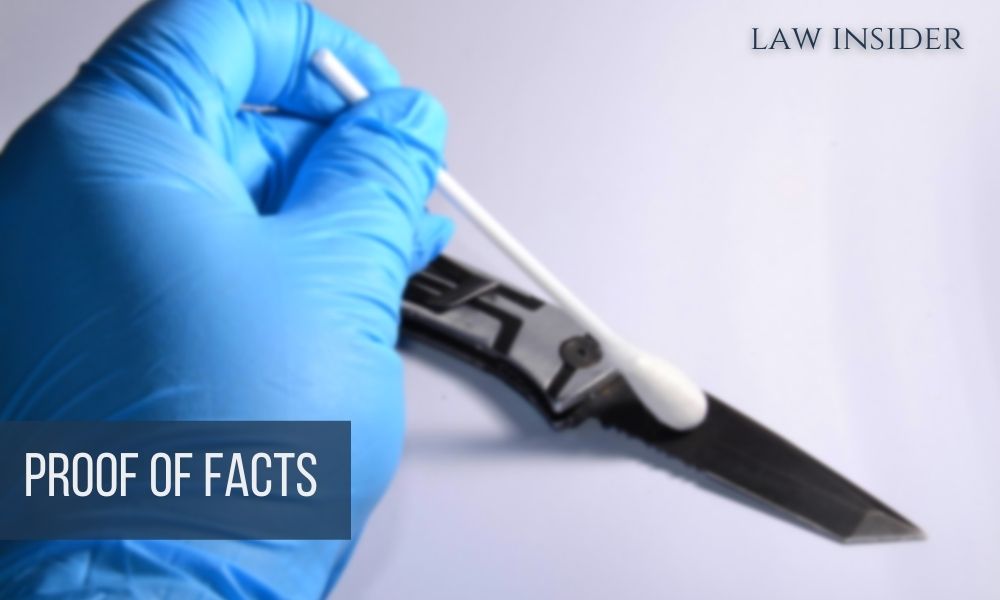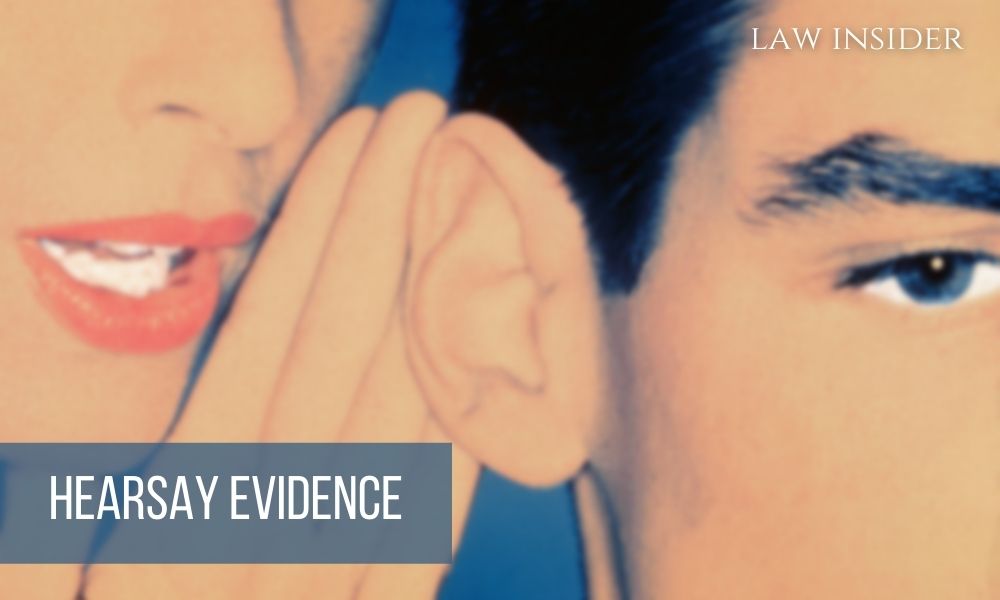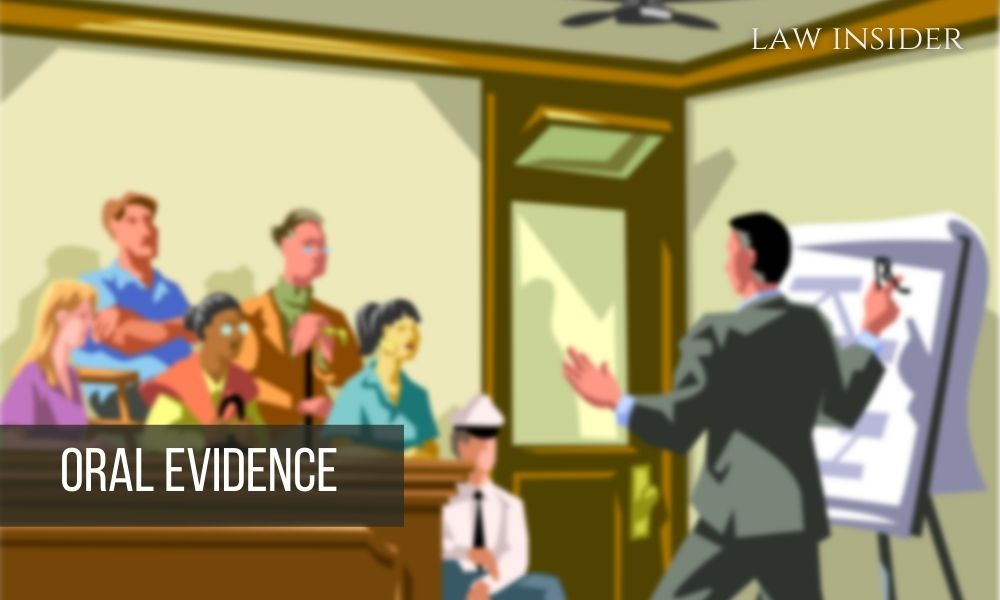Published On August 26, 2021 10:16 IST
Introduction
As we all know that evidence holds immense importance under any Court proceedings and evidence is a set of facts which proves or abstains from proving any matter. There is a whole cycle under which the evidence works in a Court of Law. It has been further divided into two main types i.e. Oral and Documentary evidence under the Evidence Act 1872.
Now we know that all the statements which were made by the witness which the court permits relating to the matters of fact is known as Oral Evidence and all the documents including electronic record as an evidence for the courts is known as Documentary Evidence. In this article we will be dealing with Oral Evidence.
Oral Evidence is dealt in the Indian Evidence Act, 1872 under the Section 59 and 60.
Under Section 3(1) of the Indian Evidence Act it is stated that “All statements which the court permits or requires to be made before it by a witness, in relation to matters of fact under inquiry, such statements are called as oral evidence”. If we look closely, the word oral in itself describes its meaning as something spoken or expressed by mouth. Hence anything which is spoken or expressed by mouth of a witness who is called for the trial in the Court is referred to as oral evidence.
But the term ‘Oral’ is different from the term ‘Verbal’ as in case Queen-Empress Vs Abdullah[i]The difference between Verbal and Oral was elaborated. The term verbal means by words and yet it is not necessary that the words should be spoken. Hence if in the section term oral is used it means the statement should be spoken by mouth. Verbal cannot be related to oral as verbal is a wider term.
Section 119 of the Indian Evidence Act, 1872 talks about Dumb witnesses as:
“A witness who is unable to speak may give his evidence in any other manner in which he can make it intelligible, as by writing or by signs; but such writing must be written and the signs made in open Court. Evidence so given shall be deemed to be oral evidence.”
Hence the signs made in open court will be deemed as Oral Evidence. This section is an addition to the Oral Evidence.
What is the importance of Oral Evidence?
In the trial every evidence plays an important role but Oral evidence has been growing. Earlier it was not considered to be as blunt as documentary was but its need and importance has been growing rapidly now. It is mostly considered now-a-days because it gives an extract about what a person wants to say in a trial and it is much easier to refer to.

Oral Evidence under the Indian Evidence Act, 1872
- Section 59 – Proof of facts by Oral Evidence
It is according to Section 59 of the Indian Evidence Act that all facts may be proved by the Oral Evidence which is except for the contents of the documents. Under Section 59 if there is any written document then in that case no oral evidence can be made to prove the said document wrong.
Oral evidence doesn’t always mean words that are spoken by mouth, but other methods also support this method. As if the witness is unable to speak he/she could also use signs to make a statement. As there prevailed a principle that if there is an availability of the Documentary evidence it shall be considered the best evidence prevailed for the particular case. Hence all the facts except the documents or any other records could be proved by Oral evidence.
The same was held in the case of Bhima Tima Dhotre Vs the Pioneer Chemical Co.[ii]:
That if the write has to be called in every case to give oral evidence of its contents then the documentary evidence becomes meaningless. If that were the position it would mean that the oral evidence would virtually be the only type of evidence recognized by law. Hence in the ultimate analysis, all evidence must be oral. This provision prove that the contents of document if proved by means of oral evidence would be a violation of that section.
- Section 60 – Oral Evidence must be Direct
According to Section 60 of the Act, Oral Evidence must be direct means that if evidence is about any fact which is heard, seen, perceived by any sense or by making an opinion. Then as per this section it could be valid only if it has been given by the person who heard, saw, perceived or formed an opinion after a particular incident. Provided that the basis on which such opinions are held may be proved by the production of such treatises.
If the author is incapable of giving evidence or is dead or cannot be found, it could not be concluded as a witness as the court regards it as unreasonable. It is further held that if Oral evidence explains about the condition of any material thing the Court gets that material thing inspected by its production. Hence this Section clears that any Oral evidence should be direct in nature which means the witness should tell the Court directly what he has experienced or has a personal knowledge about.
Credibility of Oral Evidence
The credibility of the witness giving Oral Evidence could only be doubted if the statement contracts to any previously given statement by the witness. But if the statement is already recorded before the police, then with minor contradictions also it will be held as reliable oral evidence.

What is the exception to oral evidence?
Hearsay Rule is the exception to oral evidence.
This evidence is powerless and is just the observer’s announced evidence. This evidence is the indirect evidence which does not come from the knowledge of the person who gave evidence but from someone else.
Thus, hearsay evidence is an exception of Oral evidence. Kalyan Kumar Gogoi Vs Ashutosh Agnihotri & Anr[iii] As the term hearsay denotes that kind of evidence which solely does not derive its value from the credit given to the witness himself but it rests in the part of competence of some other person. At the same time, it suggests the saying of an individual and it is considered to be irrelevant and vague. This term has been defined in this case.
But there are some exceptions to the rule of Hearsay, namely:
- Res Gestae
The rule here is that Oral Evidence must be direct and hearsay evidence is not acceptable. But Res gestae is the exception. This is clearly stated in case Conspiracy – Section 10 deals with Conspiracy.
As in case State (N.C.T. of Delhi) Vs Navjot Sandhu @ Afsal Guru[iv] It is based on the principle of agency that is operating between the parties to the conspiracy inter se and it is an exception to the rule against hearsay testimony. If the conditions laid down are satisfied, the statement made by one is admissible.
- Admission & Confession
This is also an exception made by the Hearsay Evidence as in Sahoo Vs State of U.P.[v] Supreme Court said that admission and confessions are exceptions to the Hearsay rule. Admission here means agreeing to a statement made by another person as the admission made out of court is received in evidence.
In fact a point or a statement admitted. And the Confession means a person who is charged with any criminal act when confers some statement which directly suggests a conclusion. In other terms confession is admission by the accused. Both of these are an exception to the Hearsay evidence.
- Dying Declaration
It is a statement made by a declarant who made a statement under his/her final phase of illness. The statement that declarant made relates to the cause or the situations believed for their impending death. In Kushal Rao Vs State of Bombay[vi] the Section 32 has been made by the legislature by way of an exception to the general rule of hearsay is no evidence and is also not admissible.
- Evidence in the former proceeding
Section 33 means that relevancy of certain evidence for proving the truth of facts. It also means an evidence given by a witness before Judicial proceeding for the purpose of providing the truth of the facts which is stated. It is given when the witness is dead or cannot be found or his presence cannot be obtained; the Court considers the circumstances unreasonable. Hence the meaning of this Section is a proceeding between prosecutor or accused only when the questions in the first and second proceeding are the same and the adverse party in the first proceeding has the right to cross- examine whose inquiry shall be deemed.
- Opinion published in treatises
Opinion that is published in treaties maybe an exception to hearsay evidence if all the conditions are fulfilled. The opinions of experts which is expressed in any treaty on the grounds of which opinions are held may be proved by such treaties. If the author is dead or cannot be found or has now become incapable of giving evidence or expense with the Court regards as unreasonable.
As in the case Subramaniam Vs The Public Prosecutor[vii] it created an exception to the Hearsay rule which held that no evidence of duress was found hence resulted in Appellant to be convicted and it could not be believed whether the statement made by terrorist to the appellant is true or false.
Case Laws
- State Vs Rajal Anand[viii]
Indian Evidence Act only includes word “direct” and excludes hearsay
It was held under this case that any evidence given must be direct and as it is not direct hearsay evidence does not hold any area under oral evidence. But the doctrine of Res-gestae which explained that any person who experienced any series of relevant facts, has an exception to the rule of hearsay as his testimony after the incident even if he has not seen the crime being committed will be accepted.
- Bilal Haroon Galani Vs State of Gujarat[ix]
Hearsay Evidence is inaccurate and vague
Its a rule of evidence that hearsay evidence is inadmissible and a statement oral or written given otherwise than the witness is also deemed to be irrelevant. An assertion other than one made by a person while giving oral evidence is inadmissible in the proceeding as evidence of any fact asserted. Hence hearsay evidence is admissible in the court as it plays with the mind of judge about the existence of a fact.
- Amar Singh Vs Chhaju Singh And Anr.[x]
The facts should be presented directly by the witness
A relationship between section 50 and 60 of Indian Evidence Act says that for providing evidence completely two things should be fulfilled. First is that there shall be presence of relevant facts second is those facts should be presented directly by the person who witnessed them.
- Gurubasappa And Ors. Vs Gurulingappa[xi]
Any Attempt to prove Intention of Parties Through Extrinsic Evidence will Violate Section 92
In the above case Supreme Court held that it is not competent for the Court to look into the surrounding circumstances and find out that whether the document is of an ostensible sale. If one party tries to prove the intention of another party through extrinsic evidence, this will violate Section 92 of the Indian Evidence Act of 1872.
- Bhairon Singh Vs State of Madhya Pradesh[xii]
Oral Evidence Must Be Direct
The Supreme Court observed that Section 6 of the Evidence Act is an exception to the general rule where under the hearsay evidence becomes admissible. Hence the Oral Evidence must be direct and hearsay evidence is not acceptable in the Court of Law.
Conclusion
Earlier Oral evidence was seen as a weaker evidence under Indian Evidence Act but in modern times its need and importance is growing. With an increasing approach of Oral Evidence, it could be appropriate to pass a judgement beyond a reasonable doubt if proved.
In my opinion incidents and facts could be better understood by oral ways as it is explained by the person who himself/ herself administered the incident. As he/she could explain the facts more clearly and more appropriately which is way good then documentary form of evidence.
Reference
[i] Queen-Empress Vs Abdullah on 27 February, 1885 (1885) ILR 7 All 385)
[ii] Bhima Tima Dhotre Vs The Pioneer Chemical Co.on 23 June, 1967 ((1968) 70 BOMLR 683)
[iii] Kalyan Kumar Gogoi Vs Ashutosh Agnihotri & Anr on 18 January, 2011 (Civil Appeal No. 4820 of 2007)
[iv] State (N.C.T. of Delhi) Vs Navjot Sandhu@ Afsan Guru on 4 August, 2005 (Case No.: Appeal (crl.) 373-375 of 2004)
[v] Sahoo Vs State of U.P. on 16 February, 1965 (1966 AIR 40)
[vi] Kushal Rao Vs State of Bombay on 25 September, 1957 (1958 AIR 22)
[vii] Subramaniam Vs The Public Prosecutor on 16 May, 1956 (Appeal No. 2 of 1956)
[viii] State Vs Rajal Anand on 16 May, 2008 (FIR NO: 196/1998)
[ix] Bilal Haroon Galani Vs State of Gujarat on 22 March, 2018 (R/Criminal Revision Application No. 63 of 2018)
[x] Amar Singh Vs Chhaju Singh And Anr. On 31 January, 1972 (AIR 1973 P H 213)
[xi] Gurubasappa And Ors. Vs Gurulingappa on 24 July, 1961 (AIR 1962 Kant 246)
[xii] Bhairon Singh Vs State of Madhya Pradesh on 29 May, 2009 (Civil Appeal No. 1124 of 2009)

